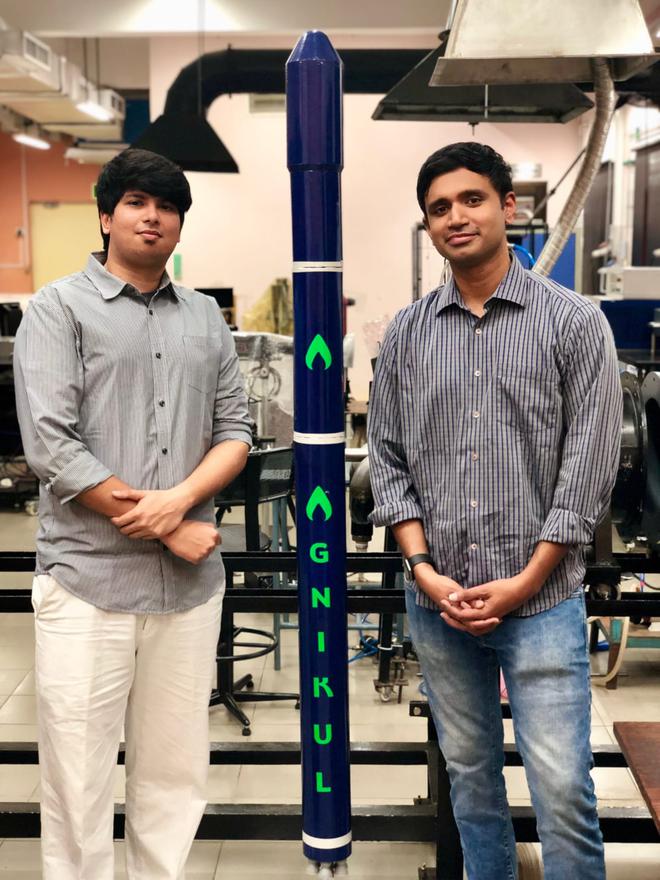Tamil Nadu will witness history when one of its space start-ups launches its first rocket on March 22. The Chennai headquartered space start-up Agnikul Cosmos Private Limited will be launching its first rocket Agnibaan Sub Orbital Technology Demonstrator (SOrTeD) from the Satish Dhawan Space Centre, in Andhra Pradesh’s Sriharikota.
There are several interesting facts about this particular launch - Agnibaan SOrTeD - will be India’s first launch from a private launchpad, India’s first semi-cryogenic engine powered rocket launch and the world’s first single piece 3D printed engine designed and built indigenously.
Founded in 2017 by Srinath Ravichandran, Moin SPM, and Satya Chakravarthy, Agnikul Cosmos became the first company in the country to sign an agreement with Indian Space Research Organisation (ISRO) under the IN-SPACe initiative to have access to the space agency’s expertise and its facilities to build Agnibaan in December 2020.

Commenting on the launch, Mr. Chakravarthy, co-founder and advisor, Agnikul Cosmos, and professor at the Department of Aerospace Engineering at the Indian Institute of Technology, Madras, told The Hindu, “This would be India’s first liquid oxygen-kerosene rocket flight in India, from India’s first privately developed launchpad, in Sriharikota.”
“More importantly, we would be flying our patented world’s most integrated single piece 3D printed rocket,” he added.
He further explained, “This is a sub-orbital launch but it is not a sounding rocket. It has the full stack of closed loop feedback guidance and control with a gimballed thrust vector control. As such, this is the first private launch in India requiring a flight termination system and a safety radius from the launchpad calculated from some tens of thousands of simulations of worst case scenarios.”
“This mission attempts to validate the guidance, control, and navigation system, the launch release hold mechanism, the entire command sequence operated by the onboard computer, telemetry and tracking - all that goes with a full orbital flight except stage separation,” Mr. Chakravarthy explained. He pointed out that the next step post the mission would be post-flight analysis of all the subsystem performance. The immediate future plan is to get ready for the orbital flight.
TN’s space ecosystem is growing
Tamil Nadu has always played a crucial role in the space sector. Over the years, several companies and MSME’s from the State have contributed to the development of minor parts for several prestigious launches, including Chandrayaan-3. During a recent interaction with The Hindu on the State’s plans in the space sector, Sandeep Nanduri, Managing Director of Tamil Nadu Industrial Development Corporation Limited (TIDCO), said, “There are numerous companies in Tamil Nadu who are part of the ISRO vendor base offering services in sectors such as design, R&D and simulation, material supply, propellants supply, sub system, mechanical and structural manufacturing, etc.”
According to details provided by TIDCO, there are several private sector entities operating like Agnikul, Data Patterns, L&T that have strong presence in the State. The details shared also mentioned, “Data Patterns has proven reliability of being a supplier to ISRO and has gradually expanded its role from sub-system manufacturer to complete satellite manufacturer. L&T has presence in Coimbatore and manufactures rocket motors for ISRO. AgniKul Cosmos Private Limited was incubated out of National Centre for Combustion R&D of IIT Madras.”
Mr. Nanduri also said that TIDCO is taking proactive steps by establishing two new space parks adjacent to the upcoming space port in Kulasekarapattinam. The first is dedicated to space-related manufacturing, catering to the needs of space organisations, and the second focuses on propellant production, crucial for rocket launches as well as related services.
Agnikul’s rocket is the second privately-developed rocket in India. In 2022, Vikram-S, India’s first privately-developed rocket, lifted off from the ISRO launchpad in Sriharikota. Developed by the Hyderabad-based start-up Skyroot Aerospace Private Limited, the 6-metre tall vehicle hit a peak altitude of 89.5 kilometres and then splashed into the Bay of Bengal about five minutes after the launch. This mission was titled Prarambh.







